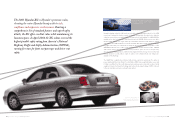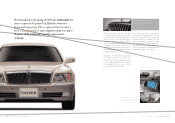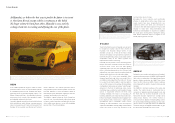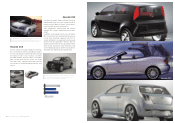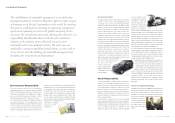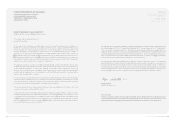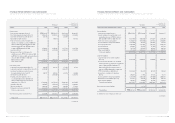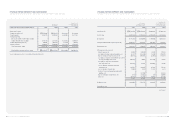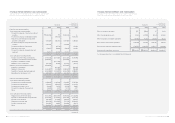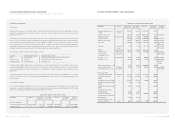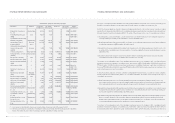Hyundai 2003 Annual Report Download - page 23
Download and view the complete annual report
Please find page 23 of the 2003 Hyundai annual report below. You can navigate through the pages in the report by either clicking on the pages listed below, or by using the keyword search tool below to find specific information within the annual report.
New Generation Vehicles
Nowadays, hybrid electric vehicles and fuel cell electric
vehicles are two of the most highlighted trends
worldwide. They are truly environmentally-friendly
vehicles in terms of fuel efficiency and CO2 emission
reduction (a major source of global warming). Hybrid,
which means mixture or complex, is the intermediate
stage for developing fuel cell electric vehicles. The
hybrid electric vehicle combines merits of internal
combustion engine and electric vehicle to achieve high
fuel-efficiency and emission reduction. The fossil fuel
depletion issue and environmental problems led to the
development of the hybrid electric vehicle. Meanwhile,
the fuel cell, which is an electro-chemical device, directly
produces electricity by reacting hydrogen with oxygen
in the air, without the combustion process. The fuel cell
electric vehicle achieves the same level of emission
performance and silence as the electric vehicle and
better fuel efficiency than the hybrid electric vehicle. In
comparison to the internal combustion vehicle, it
achieves the same level of fuel supply convenience and
drive performance. With hydrogen as
fuel, it emits nothing but water.
The fuel cell electric
vehicle is expected to
reduce environmental
pollution and fossil fuel
consumption when it is
commercialized.
Social Responsibility
Social Responsibility is a high priority of Hyundai in
realizing its Sustainable Management goals. As a
massive provider of mobility and employment around
the world, Hyundai recognizes its influence on social
harmony and is pro actively endeavoring to make a
positive contribution to society. Social contribution,
Employee Value and Customer Safety are three key
areas of importance to Hyundai in its effort to become a
better corporate citizen.
Hyundai Motor’s employees are its most important
asset, and looking after them is one of the automaker's
highest priorities. Hyundai Motor provides an employee
benefits package including medical examinations and
various welfare programs to contribute to our
employees’ quality of life, and have them be confident
to be a member of the
Hyundai Motor family.
In addition, employee
training programs are
provided to enhance the
capabilities of employees
within the organization
and to improve individual aptitude in performing their
assignments. Our effort on educating people extends
beyond our own employees to include their families.
Hyundai organizes a number of events for employees
and their families, including ‘Love and Respect Your
Parents’ event, the ‘Cherry Blossom Festival’ at the Ulsan
plant and annual sports competitions. Such events help
bring the company’s employees together and helps
create bonds between labor and management.
A Social Contribution Committee has been established
to plan, perform and evaluate all activities related to
social contribution. The SCC is expanding its scope of
work and conducts various environmental activities
including migratory bird protection, local streams clean
up and sponsoring various NGO activities.
Hyundai Motor also recognizes the assurance of
driver, passenger and pedestrian safety as a key
element of social responsibility. Hyundai is
developing the Advanced Safety Vehicle (ASV)
system, which can be characterized by the use of
artificial intelligence. Getz, a small-sized passenger
vehicle equipped with Frontal Crash ASV system,
scored top rating in the Euro New Car Assessment
Program (NCAP). In line with such technical
advancements, Hyundai Motor is engaged in safety
promotion programs such as Junior Traffic Safety
Campaign.
Activities for the physically challenged
Hyundai recently purchased 3000 wheelchairs from the
American Wheelchair Foundation and donated them to
the South Korean Red Cross. The Wheelchairs were
donated to the elderly, the physically challenged with
low income, and small scale infirmaries in remote areas.
Hyundai Motor produces
vehicles including Getz,
Accent, Elantra, Sonata,
XG, Matrix and H-1 for
physically challenged
drivers.
Hyundai Motor Company Annual Report 2003 _4443_Hyundai Motor Company Annual Report 2003
Sustainable Management
The establishment of sustainable management is one of four key
management policies essential in Hyundai’s effort to realize its goal
of becoming one of the top 5 automakers in the world. In executing
this goal we at Hyundai are focussing on improving management
systems and expanding our role in the global community in two
core areas: the environment and society. Meeting these objectives is a
responsibility that Hyundai shares with the entire automotive
industry, as the industry moves collectively toward a more
sustainable and a more productive future. We invite you, our
stakeholders, customers and fellow global citizens, to come with us
as we strive to meet the challenge of sustainable management for
the future, the environment and humankind.
Environmental Responsibility
The environment is a key issue of sustainable
management, and a core corporate value of Hyundai
Motor. In 2003 Hyundai launched a corporate-level
environment organization and established a company-
wide environment management strategy, created
through analyzing the entire corporate value chain.
The environmental management strategy designated
key tasks as follows: the establishment of an
environmentally-friendly product development system
to meet regulatory requirements and strengthen
environmental performance of its products; the
reduction of pollutants and improvement of the clean
production system through green purchasing; and the
establishment of an environmentally-friendly system
for marketing, sales and aftermarket. In addition,
Hyundai Motor will accelerate development and
commercialization of next-generation environmentally-
friendly vehicles such as hybrid electric vehicles and
fuel cell electric vehicles. Moreover, Hyundai Motor will
strive to develop more recyclable and easily dismantlable
components to contribute to the
conservation of natural
resources and the
environment.
2002/2003 Sustainability Report
Santa Fe Electric Vehicle in AthensDonation of Wing body Trucks to Beautiful ShopsChairman Mong-koo Chung declaring the
ECO GT5 2010 Initiative
Matrix Modified for The Physically Challenged
Tucson
Fuel Cell Electric Vehicle







